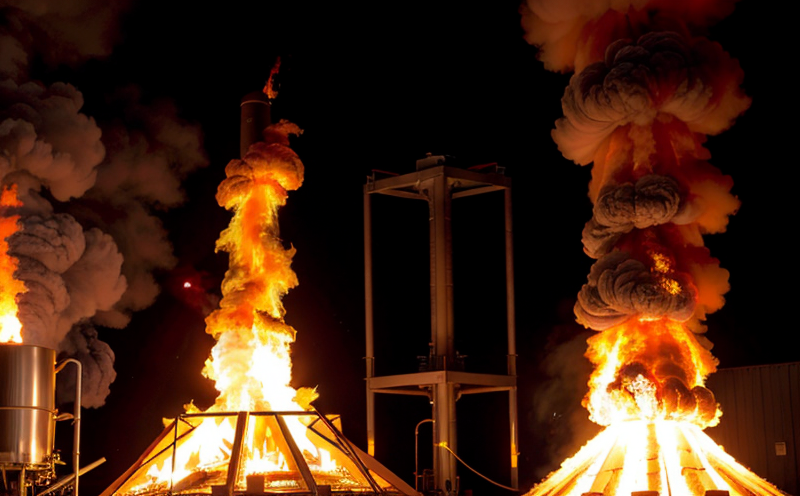Processed Food Chemical Safety Testing
Processed food chemical safety testing is a critical component of ensuring that food products are safe for consumption. This service focuses on identifying and quantifying the presence of potentially harmful chemicals, additives, and contaminants in processed foods. The primary goal is to prevent contamination, ensure compliance with regulatory standards, and maintain consumer trust.
The process begins with careful specimen preparation, where samples are extracted from various stages of production or directly from finished products. These samples undergo a series of tests using advanced analytical instrumentation such as gas chromatography-mass spectrometry (GC-MS), liquid chromatography-tandem mass spectrometry (LC-MS/MS), and Fourier transform infrared spectroscopy (FTIR).
One of the key challenges in processed food chemical safety testing is the diverse range of potential contaminants, including preservatives, additives, pesticides, and other residues. The testing protocols must be rigorous enough to detect even trace amounts of these substances. Compliance with international standards such as ISO 17025 for laboratory competence ensures that our tests are accurate and reliable.
The results of the chemical safety testing provide critical insights into the quality and safety of processed foods. These findings can help manufacturers make informed decisions about ingredient sourcing, production processes, and product labeling. By identifying potential issues early in the development or supply chain process, companies can take corrective actions to prevent contamination and ensure that their products meet all necessary regulatory requirements.
Environmental and sustainability considerations are also paramount in processed food chemical safety testing. The tests help minimize waste by ensuring that only safe materials are used in processing. By reducing the risk of contamination, these tests contribute to more sustainable production practices. Additionally, the results can inform recycling initiatives and support efforts to reduce environmental impact.
- Reduction in chemical-based contamination leading to less hazardous waste
- Support for more sustainable sourcing of raw materials
- Promotion of safer disposal practices through accurate testing results
- Encouragement of circular economy principles by identifying reusable components
Why It Matters
The importance of processed food chemical safety testing cannot be overstated. In a world where foodborne illnesses and contamination incidents can have severe consequences, ensuring that processed foods are safe for consumption is essential. Regulatory bodies around the globe enforce stringent standards to protect public health.
Processed foods often contain numerous ingredients, some of which may pose risks if not properly controlled or regulated. For instance, preservatives like benzoic acid and sulfites can be harmful in high concentrations. Similarly, heavy metals such as lead and mercury can accumulate over time, potentially leading to serious health issues.
By conducting thorough chemical safety testing, manufacturers can identify and mitigate these risks before they reach the consumer. This proactive approach not only enhances product quality but also builds a positive reputation for the brand. Consumers today are increasingly concerned about what they eat, and having a proven track record of safety can be a significant competitive advantage.
The testing process itself is designed to cover a wide range of potential contaminants. From naturally occurring elements like arsenic in rice to synthetic additives like propyl gallate, no stone is left unturned. The goal is to provide a comprehensive analysis that leaves no room for doubt about the safety of the product.
Moreover, compliance with international standards ensures that processed foods meet not just local regulations but also those set by global markets. This broadens market access and fosters trust among consumers who are increasingly aware of cross-border trade dynamics.
International Acceptance and Recognition
The importance of processed food chemical safety testing extends beyond national borders, as international standards play a crucial role in ensuring that products meet global requirements. Compliance with these standards is essential for manufacturers looking to expand their operations internationally.
ISO 17025 and ASTM E386 are two widely recognized standards that govern laboratory competence and analytical methods, respectively. These certifications ensure that the testing processes are robust, consistent, and reliable across different regions. By adhering to these standards, laboratories can provide credible test results that are accepted worldwide.
Many countries have their own specific regulations for processed food safety. For example, the European Union's legislation on contaminants in food is stringent and covers everything from maximum levels of pesticide residues to limits on heavy metals like cadmium. Similarly, the United States has strict guidelines under the Food Safety Modernization Act (FSMA), which mandates comprehensive testing practices.
By aligning with these international standards, laboratories can ensure that their test results are not only accurate but also compatible with global expectations. This alignment facilitates smoother trade and fosters mutual trust among stakeholders involved in food production and distribution.





